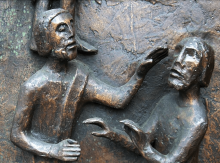theodicy

Time after time, these Christians would lay hands on me while I waited in line at Starbucks or the food court at the local mall. They’d try and cast out evil demons, pray that my faith would be strengthened, or command in Jesus’ name that I get up and walk (even though I could already walk). Each time, they would stand back as if they’d just recited the magic words. Each time, with progressively less optimism and greater anger, I’d step forward only to find out I wasn’t healed. Some would accuse me of not having enough faith, but most just apologized and went on with their day. I was left alone. Still limping, still furious.

Midnight Mass is the latest from horror filmmaker Mike Flanagan (creator of The Haunting of Hill House and The Haunting of Bly Manor), who excels in slow-creeping, character-based horror. It’s also a project through which Flanagan, a former Catholic, processes his feelings about scripture, religion, and the church. As an artistic representation of someone deconstructing their faith, Midnight Mass employs horror tropes to explore the ways religion responds to pain, both in ways that heal and ways that destroy.

When we do not take care of the earth and allow powerful individuals or companies to plunder the land God has called good (Genesis 1), the people who are disproportionately impacted are the marginalized. This discrepancy between those who benefit and those who suffer highlights the way our society is structured to benefit oppressors at the expense of people who are poor, hungry, and disenfranchised.

One of the most common criticisms of faith I have heard is this: if there is an all-powerful and loving God somewhere out there, why does this God allow horrible things to happen? In a world where there has always been war, sexual violence, starvation and murder, where is this omnipotent God? Why does he allow these things to happen? Where is she when people suffer injustice?
The Bible gives us plenty of examples of the abuses of the faithful, sometimes even at God's own hand (like in the book of Job). We read of the systemic oppression of the Jewish people and the early Christian church. Through this, God's people were always able to remain steadfast in their faith. Forming a defense of faith in God in the face of realized evil is known as theodicy.
So: In a nation where Blacks have been enslaved, lynched, and raped because of their race, and in time where people must declare that “black lives matter,” how do black Americans form their own theodicy to justify this violence, abuse, and systemic oppression?
And is it necessary to do so?

“Oh, God!”
That cry has echoed ever since news of the horrific shooting at Sandy Hook Elementary School in Newtown, Conn.
As the names of those who died are made known, that cry is followed by a question: Why? Why does God allow evil?
This agonizing question arises among religious believers after tragedies great and small. It’s also one that priests, pastors, rabbis, and imams will wrestle with.
The Rev. Jerry Smith of St. Bartholomew Episcopal Church in Nashville said that although this weekend marked the third Sunday in Advent, which focuses on hope in advance of Christmas, the church also has to talk about the reality of evil.
“We have to speak about this shooting and we have to recognize, this is the very darkness that Christ came into the world to dispel,” Smith told The Tennessean.
The Rev. Neill S. Morgan, pastor of Covenant Presbyterian Church in Sherman, Texas, says on the congregation’s website that now is a time for prayer.
But, says Morgan, “all the existential questions about God, justice, and love” will come. “We wonder what we can do to prevent such violence in the world, our nation, and our community.”